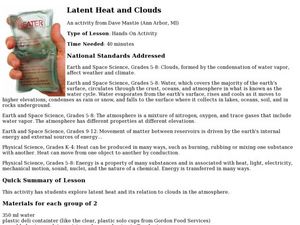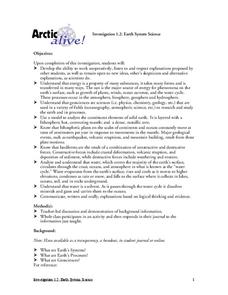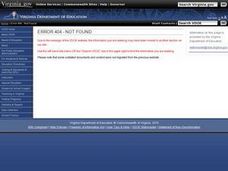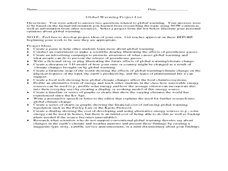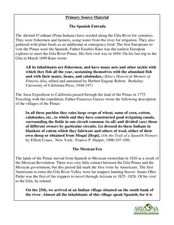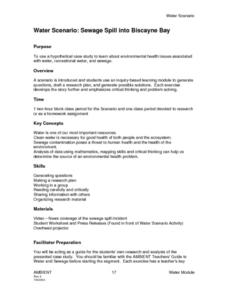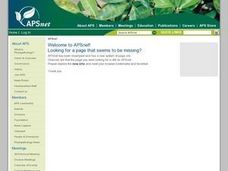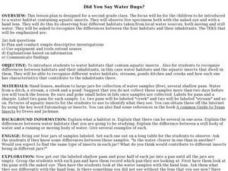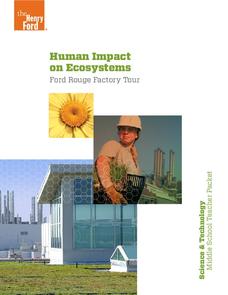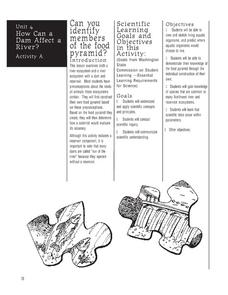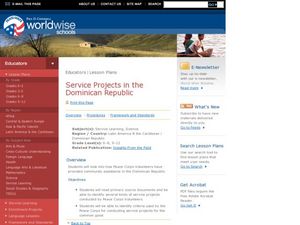Curated OER
Florida's Springs
Students calculate the water usage for irrigation of school grounds. They use maps in determining which areas are irrigated.
Curated OER
What is Energy?
Students define energy and identify the different types that exist. They identify places they see, hear or feel energy. They understand the role of engineering in finding and testing sources of energy for the production of electricity.
Curated OER
Settling The Wasterwater Problem
Learners name models that are representations of larger objects. They suggest ways that industry, agriculture, and mining affect water quality. Pupils demonstrate the use of lagoons for treating wastewater. Students define the...
Curated OER
Latent Heat and Clouds
Learners explore latent heat and how it relates to clouds in the atmosphere. In this earth science lesson students investigate how clouds are formed. Learners examine clouds and the water cycle.
Curated OER
Earth System Science
Students explore the Earth and its ability to support life. They discuss the geosphere and the water cycle and complete the Water Wonders activity. After completing the activity, they respond in their journals and reflect upon the...
Curated OER
Journey of a Raindrop to the Chesapeake Bay
Young scholars explore the water cycle and the path a single drop of water would take if it traveled from their schoolyard to the Chesapeake Bay in Virginia.
Curated OER
Deep Blue: Exploring the Deep Ocean
Students examine landforms. In this social studies lesson, students bounce a beach ball around in order to discover that seventy percent of the Earth is covered in water. Students
Curated OER
Maintaining the Natural Balance
For this pollution worksheet, students will identify the sources of air, water, and land pollution. Then the students will list some of the problems caused by these types of pollutions in 3 short answer questions.
Curated OER
Earth Science
Students explore how water and waves erode the earth. In this erosion lesson students determine the processes of wave erosion and building.
Curated OER
Lesson Plan: Global Warming
High schoolers explore the concept of global warming. In this climate change lesson, students explore the provided links to PBS NOW sources and research the greenhouse effect and the effects of global warming. High schoolers support...
Curated OER
The Spanish Entrada
In this Arizona history worksheet, high schoolers read a 5 page selection that includes primary sources about time periods in the state's history. Students then respond to 5 short answer questions based on the selection.
Curated OER
The Boston Tea Party: Massachusetts Gazette
In this primary source analysis worksheet, students respond read an article from the 1773 Massachusetts Gazette regarding the Boston Tea Party. Students discuss the excerpt and its significance in American history.
Curated OER
Sewage Spill into Biscayne Bay
Students use a hypothetical case study to learn about environmental health issues associated with water, recreational water, and sewage. They use an inquiry-based learning module to generate questions, draft a research plan, and generate...
Curated OER
Water Molds (Oomycetes)
Students explore a group of fungus-like organisms; the Oomycetes, by baiting them from natural sources (water and soil) and observing them.
Curated OER
Did You Say Water Bugs?
Second graders observe live specimens of aquatic insects in a water habitat. They study specimens from both moving and still water with the naked eye and a hand lens.
Henry Ford Museum
Human Impact on Ecosystems
An environmenta science unit includes three lessons plus a cumulative project covering the ecosystem. Scholars follow the history of the Ford Rouge Factory from its construction on wetlands and how it destroyed the environment to its...
Foundation for Water & Energy Education
How Can a Dam Affect a River? Activity A
Written for Washington state students in life science, this lesson provides an opportunity to examine the residents of local freshwater habitats. You or the class collects a water sample, and learners try to examine what organisms live...
Curated OER
Fresh Water and land of Kiribati and Hawaii (Molokai)
Fourth graders examine the islands of Hawaii. Using this information, they organize it and create a map or graph that represents the data. As a class, they discuss how the watersheds on the islands are different and how people react to...
Curated OER
Service Projects in the Dominican Republic
Students examine the role of Peace Corps volunteers. In this service instructional activity, students investigate service projects that feature agriculture, small business, education, environmental education, and health concerns in the...
Carnegie Mellon University
Nuclear Energy
Extensive background material, clear objectives, and more are provided to help you teach an introduction to nuclear power. Learners will be able to explain how nuclear power is generated and how it compares to coal-created power. Provide...
Curated OER
Making a Water Filter
Fifth graders draw a plan that they think will clean the sludge in a jar. Students construct the treatment system they designed, take a bottle of sludge to the system and try it out, writing down what happened.
Curated OER
Non-Point Source Pollution
Students study non-point source pollution. They research the concept of bio-degradation and/or Nutrients/Fertilizers and discuss how non-point source pollution impacts the environment. Afterwards, they participate in an interactive...
Curated OER
Is Your Water Clean?
Students compare water quality of different sources. They test water samples for odor, phosphates, pH, bacteria, and dissolved solids. they fill out a data table and answer questions about their findings.
Curated OER
Alternative Energy Resources
In this alternative energy resources worksheet, students read and describe the advantages to using tidal power. Then they identify and list some of the disadvantages to using tidal power as mentioned in the brief excerpt read. Students...
Other popular searches
- Sources of Water Pollution
- Water Sources Grades K 2
- Water Sources K 2
- Activities on Water Sources
- Natural Water Sources
- Water Sources in Qatar
- Types of Water Sources
- Landforms Water Sources
- Sources of Water
- Streams as Water Sources
- Natural Sources of Water
- Water Sources in Drought





